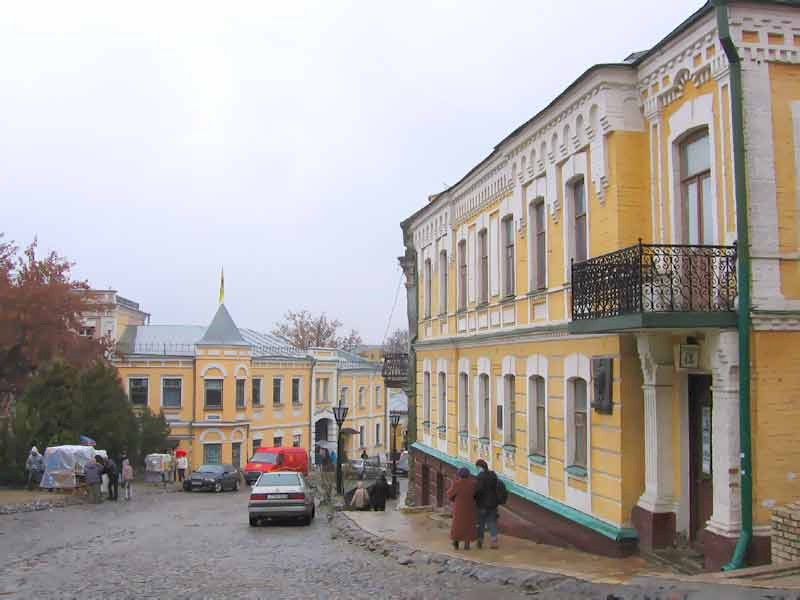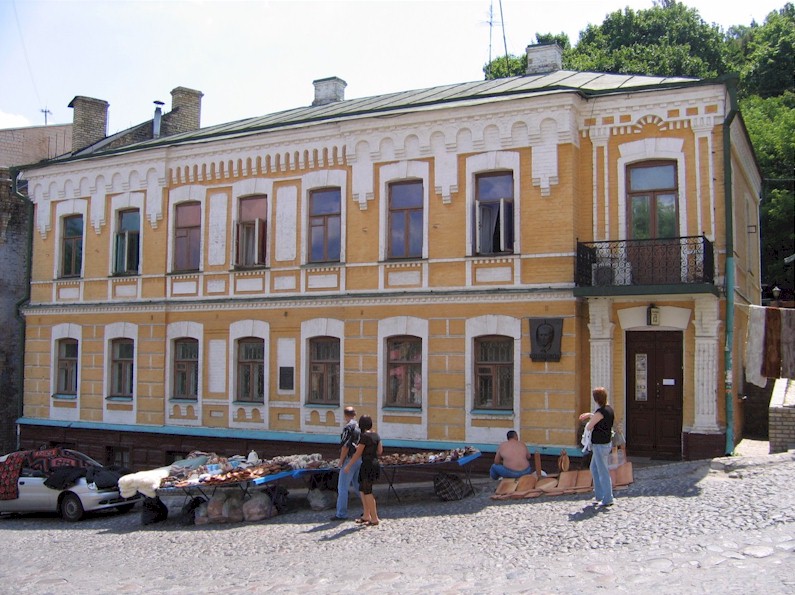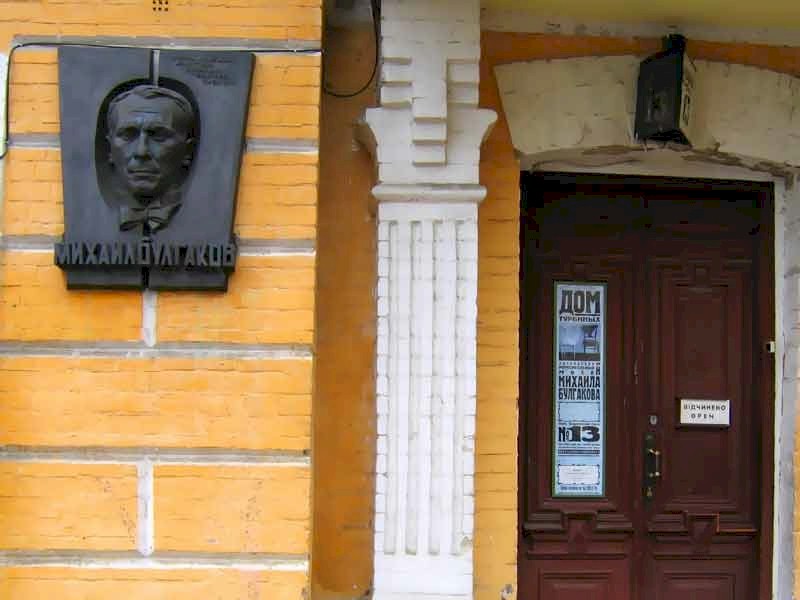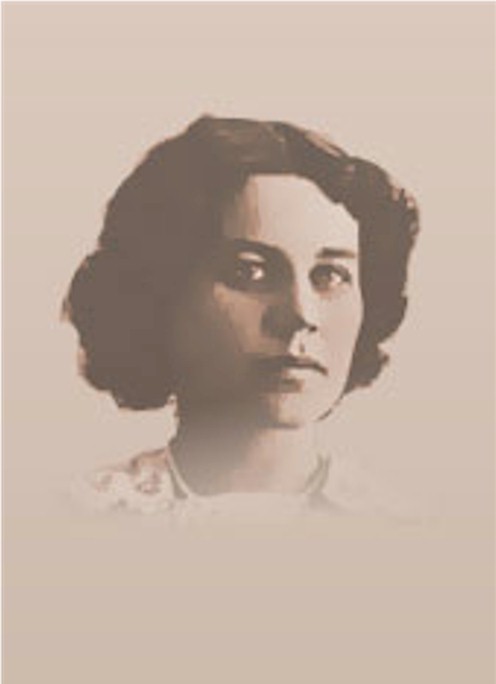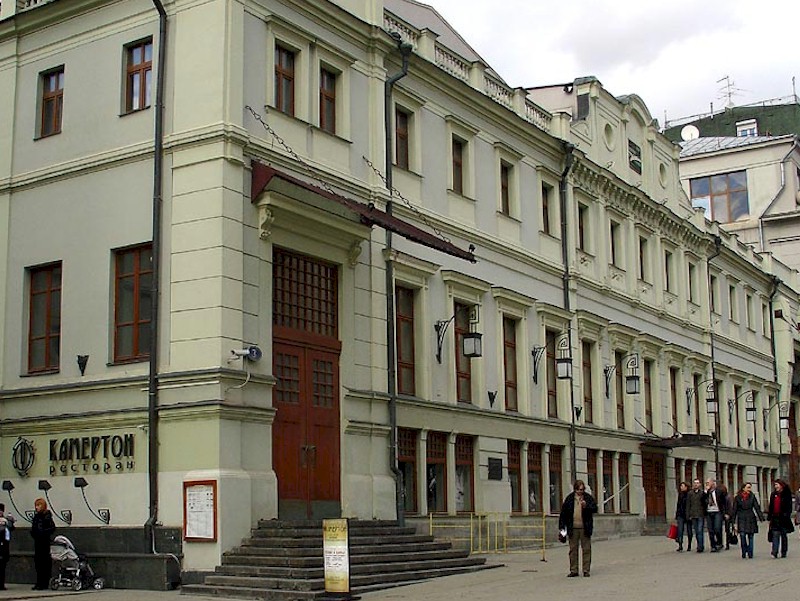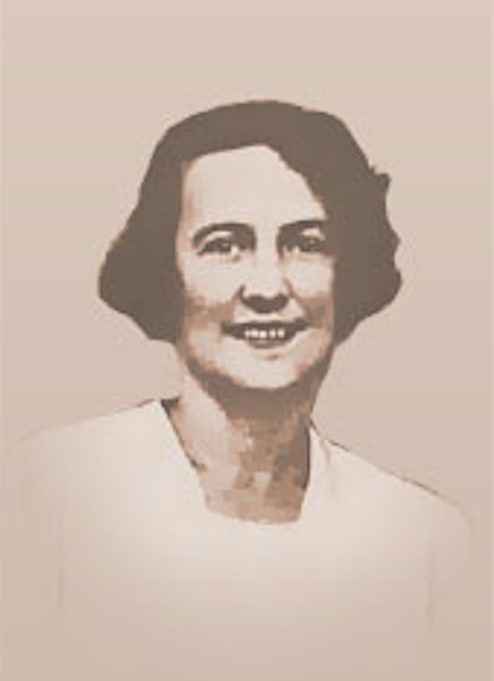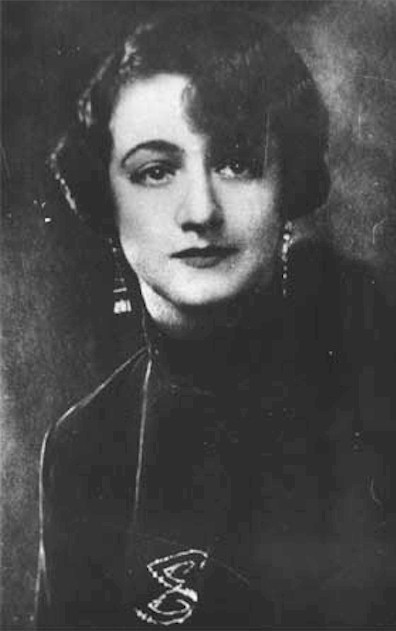Биография Михаила Булгакова
Русский > Михаил Булгаков > Биография
Mikhail Bulgakov in Ukraine
Mikhail Afanashevich Bulgakov was born on May 3 [15], 1891 in Kiev, Ukraine's current capital. He grew up in a family of 7 children. His father was professor at the Theological Academy. After having finished his middle school at the local Gymnasium Bulgakov went to the Medical Faculty of the St-Vladimir University in Kiev, where he graduated in 1916. Before he had met Tatiana Nikolaevna Lappa (Tasia), with whom he had watched in 1912 at least ten times the opera Faust of Gounod. In 1913 he married her. He started working at the Military Hospital and then at the Tchernovtsy hospital, both in Kiev. With Tasia he moved to the Smolensk countryside to become a local doctor. His experiences there were described in A Country Doctor's Notebook.
In 1918 Bulgakov returned to Kiev, where different parties were fighting to each other. He started a doctor's practice at Andreyevsky spusk 13 in the house where he was living with his parents, brothers and sisters since 1906, and which he would describe extensively in his novel The White Guard. The house is now a Bulgakov museum.
To the website of the Bulgakov museum in Kiev
It was at the end of World War I, when Ukrainean nationalists, the Red Army (the bolsheviks) and the White Army (the anti-bolsheviks) were fighting to each other. Bulgakov has known ten different changes of power. Several times successive governments drafted the young doctor into their service. In 1919, he was drafted by the White Army, again as an army physician and then transferred to the Northern Caucasus. There he became seriously ill and barely survived. After this illness he abandoned his career as a doctor for that of a writer. In his autobiography, Bulgakov recalls how he started writing : "Once in 1919 when I was traveling at night by train I wrote a short story. In the town where the train stopped, I took the story to the publisher of the newspaper who published the story". His first plays, Self-defense and The Brothers Turbin, were written in Vladikavkaz and shown there on the city stage with great success. At the beginning of 1920 he abandoned his career as a doctor for that of a writer.
His brothers were exiled to Paris. Nikolai (1898-1966) became a notorious bacteriologist, Ivan (1900-1968) became, like the stereotype of a White Russian emigrant, first balalaika player and then taxi driver. Mikhail Bulgakov never left Russia, he never got the documents to visit his brothers in France.
Mikhail Bulgakov in Moscow
In 1921, the civil war came to an end. Mikhail Bulgakov first searched for a possibility to emigrate from a port at the Black Sea, but he stopped his efforts after some unsuccessful attempts. After some wanderings in Vladikavkaz, Piatigorsk, Tiflis, and Batum, Bulgakov went to Moscow in 1921, intending «to remain here forever». He tried to make a living as a writer. He combined clerical office work with writing for commercial magazines. To avoid starvation he had joined a group of travelling actors who were playing in the suburbs. When, in 1922, the newspaper Рабочий (Rabochy) or The Worker was established, he started writing for it using the name of Mikhail Bul. He was appointed secretary of the literary department of Главполитпросвет (Glavpolitprosvet), the Central Bureau for Political Education. He worked there as a correspondent and wrote feuilletons for the newspapers Gudok, Krasnaia Panorama and the Berlin newspaper Nakanune, which would publish many of his works in the western world. He got his first divorce and married to Lyubov Yevgenyeva Belozerskaya (1894-1987) in 1924.
He wrote both funny stories and novels - The Heart of a Dog, The Fatal Eggs, Diaboliad and The Adventures of Tchitchikov. His characteristic was satire - he just couldn't help it: «My spirit is satirical. And I write stories that are probably unpleasant to the communist regime. But I always write exactly what I see, honestly! The negative in the land of the Soviets draws my attention and it is feeding my work as a satirist».
His novel The White Guard (1924) was one of the few works published in the Soviet Union which sympathetically portrayed the supporters of the White cause during the civil war. It was first published in the newspaper Rossiya, and later it was adapted to a theatre play for the still existing Московский Художественный театр (Moskovsky Khudozhestvenny Teatr), the Moscow Art Theatre or MKhAT. The play was called The Days of the Turbins, and was premiered in 1926. Bulgakov had to make drastic changes in the original text, and he had to reduce it from four acts to three. In 1969, the Russian literary critic Viktor Petelin (°1929) had written an article on M.A. Bulgakov and The Days of the Turbins in Ogoniok, one of the oldest weekly illustrated magazines in Russia. In this article, he claimed that Stalin had seen The Days of the Turbins 15 times (Ogoniok, 1969, Issue XI, p. 27). However, the M.A. Bulgakov Museum in Moscow has got a copy of an article making reference to this, with the handwritten note «Это липа!» or «This is fake!». According to the museum, it was Lyubov Yevgenyeva Belozerskaya, Bulgakov's second wife, who had written this comment.
Be that as it may, Bulgakov's next piece, the comedy Zoya's apartment, was a huge success. Later, in The Flight he described the terror of a fratricidal war. But the Главрепертком (Glavrepertkom) or the Central Bureau for Repertoires, which had the authority to censor or ban theatre plays, judged that the play glorified the emigration of the White generals, and it was banned. Bulgakov was one of the most popular playwrights of his time, but his plays were highly criticized in the soviet press. On September 15, 1929 the newspaper Izvestia wrote: «His talent is patently obvious, but so is the reactionary social character of his work». As the Soviet Union became more rigid ideologically at the end of the '20's, Bulgakov's work was put more under fire, and all his plays were totally banned in 1929. In that period Bulgakov started working on The Master and Margarita, and he got acquainted with Elena Sergeevna Shilovskaya (1893-1970), with whom he started a passionate relation. Her maiden name was Elena Sergeevna Nyurenberg, but when she met Bulgakov she was married to her second husband, army officer YevgenY Aleksandrovich Shilovsky (1889-1952). The two met each other at the home of the brothers and artists Moyseenko at Bolshoy Gnezdnikovsky pereulok No. 10, a lane down Tverskaya.
In July 1929 Bulgakov wrote his first letter to the Soviet government and to the writer Maxim Gorki, asking the authority to leave the country.The critics in the newspapers were very hostile. Terms like сукин сын (son of a bitch), мурло (dirty snout) and литературний уборщик (literary scavenger) were used almost daily. Sentences like «Micha Bulgakov rummages around on rubbish dumps», «he keeps messing around», «"he roots in the leftovers after a dozen of guests has thrown up» and «I'm a sensitive guy, I'll just bash his head down with a sink» could be read. The most offensive critic was Anatoly Lunacharsky (1875-1933) who had been the People's Commissar for Education, Enlightenment and Sciences until 1929.
Bulgakov found himself without income and he did what so many writers did in the soviet period: he wrote a letter to the government of the Soviet Union on March 28, 1930. He mentioned, among other things, that in ten year of authorship, he had read 301 articles on him in the soviet press, «Из них: похвальных - было 3, враждебно-ругательных - 298» or «among which: laudatory - 3, hostile-abusive - 298».
In this letter he also asked, explicitly in capitals: «I demand the government of the USSR to order me urgently to leave the borders of the USSR accompanied by my wife Lyubov Evgenyeva Bulgakova».
His sincerity may be questionable because, when Bulgakov was called by Stalin in person a few weeks later, on April 18, 1930, four days after the suicide of Vladimir Vladimirovitch Mayakovsky (1893-1930), and Stalin asked him if he really wanted to leave the country, Bulgakov replied that, as a Russian writer, he could never live outside Russia and the Russian language. We will never know what would have happened if he had replied positively to Stalin's question. It's highly probable that Bulgakov knew very well that Stalin would have arrested him rather than comply to his request. Anyway, Bulgakov's statement that he wanted to stay in Russia went down well. Stalin ended the conversation by saying that Bulgakov's petition to the Soviet government would have a positive result. Soon after it he was offered a job as an assistant-director at the Moscow Art Theatre.
1930 was a rather fortunate year for Bulgakov, but it changed when, early 1931 Elena Sergeevna, decided that they could not see each other anymore. Her husband, Yevgeny Aleksandrovich Shilovsky, a highly placed military had found out about their relation and she was worried about the well-being of her two sons. Bulgakov made some more attempts to go abroad, like for visiting his brothers, but it didn't work out.
In June 1932 he met Elena Sergeevna again, and this time for good. In September her marriage was dissolved, and on October 4 she married Bulgakov, the day after his divorce from Lyubov Yevgenyevna.
Bulgakov started making more adaptations and historical fiction, whih was ideologically less dangerous than writing original works. He adapted Gogol's Dead Souls and Cervantes' Don Quichote for the Russian theatre. He also wrote a biography of the French playwright Molière, and soon after that a play called The Cabal of Hypocrites. It's about the situation of a writer under an autocratic dictatorship. After four years of rehearsals in the Art Theatre it was put under fire in the newspaper Pravda and after 7 performances it was banned. Another play, Pushkin (The Last Days), was about the same subject and got the same treatment. Bulgakov was in a stew again and this time he became a writer of librettos for the Bolshoi Opera.
Bulgakov hoped to find favour again with the regime by writing a play about Stalin on the occasion of his 60th birthday. The play, Batum, was enacted in the Caucasus and depicted Stalin's young years as an activist. On August 15, 1939, Bulgakov was on his way to Batum by train to start the rehearsals when he was called back to Moscow by an express telegramme. The play was banned. This new setback must probably have had an influence on his unstable health.
In September 1939, Bulgakov lost his sight during a trip to Leningrad. As a doctor he immediately realized that this could be a symptom of nephrosclerosis, the illness of which his father died. His friend and doctor Andrey Andreevich Arendt (1890-1965), the founder of neurosurgery for children in the Soviet Union, sent him to neuropathologist Mikhail Yulevich Rapoport (1891-1967), who referred Bulgakov to professor Miron Vovsi (1897-1960), who examined Bulgakov on September 17, 1939.
Vovsi was known for being rather short in expressing his diagnosis. He immediately told Elena Sergeevna that Bulgakov would die within three days. Bulgakov would not die until seven months later, but he couldn't stop thinking of the meeting with Vovsi, and on January 15, 1940, he dictated the scene about the buffettef Andrey Fokich Sokov of the Variety Theatre and his meeting with professor Kuzmin to his wife Elena Sergeevna.
Bulgakov died on March 10, 1940, two weeks after he had dictated new corrections for The Master and Margarita.
Поместить эту страницу |
